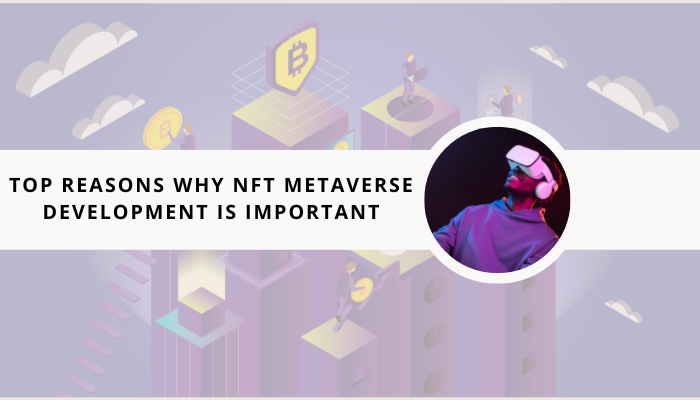Top Reasons Why NFT Metaverse Development Is Important
There are many reasons why the development of the NFT metaverse is important. These include the need for smart contracts, the potential for airdropping, and the storage of sensitive data. However, there are also many drawbacks to the technology. If you’re interested in metaverse development, you’ve come to the right place.
Here Are The Top Reasons Why NFT Metaverse Development Is Important
The necessity of smart contracts
Smart contracts are a necessary part of blockchain systems, and they’re becoming increasingly important for NFT Metaverse development. They allow for faster development and reduce the costs of running different metaverse projects. These contracts are also the engine of blockchains, and they will be required to support blockchain-based dapp development.
Blockchain technology ensures that ownership of a digital asset is transparent, as it is in the real world. This means that a person who purchases a token is able to transfer it to another person without the need to worry about fraud. As a result, Metaverse will provide a transparent ecosystem where ownership is indisputable.
The NFT Metaverse uses blockchain technology to connect real and virtual worlds. The platform can also function as a public blockchain. While building the software, it is important to choose a blockchain network carefully, as the marketplace will be operating there for a long time. Some of the most popular blockchain networks are Ethereum, Polkadot, and Solana.
Read more interesting information about smihub
Potential for airdropping
Airdropping is a potentially powerful feature for NFTs. It could enable the delivery of branded merchandise and special access privileges to fans. It could also facilitate location-based engagement and augmented reality. Using this feature could benefit a variety of sectors, including the entertainment industry, the media, and technology.
The Metaverse is a digital environment operating on blockchain technology. It brings together advanced technology, including virtual and augmented reality to offer limitless social interaction and business opportunities. Its decentralized nature also makes it flexible, scalable, and interoperable. This is one of the main advantages of NFTs. These tokens can be bought and sold by anyone, and the ability to airdrop them allows anyone to gain access to a plethora of services.
In addition to the use cases mentioned above, NFTs could also be used to create a more expansive metaverse ecosystem. For instance, NFTs could be used as virtual property, with smart contracts that would control access. This could help users gain exclusive access to certain parts of the metaverse. In addition, NFTs could also be used to sell real estate on the metaverse, with smart contracts governing the process.
Ability to store sensitive information
One of the challenges in implementing NFT is the storage of sensitive information. This data may be processed by actors who use the Metaverse to gather information or make decisions. If you are a Metaverse actor, you need to have explicit consent to collect and use personal information. This would mean a privacy notice that is jointly displayed to your users, and it is important to have a clear process in place for collecting consent and protecting your data.
The European Commission (EC) is attempting to address this issue by establishing a new regulatory framework. This framework would include regulations on the use of online intermediaries such as social media platforms and search engines. The goal is to create a fair, sustainable, and transparent online business environment. The regulation would also help increase consumer protection by defining and implementing redress obligations for businesses.
The Metaverse has tremendous potential. By enabling cross-platform usage of virtual items, it will allow businesses to make the most of their digital assets. For example, companies could develop play-to-earn video games that allow users to collect Metaverse tokens and then sell items, places, or services. Ultimately, a crypto-powered metaverse could democratize the internet and accrue significant value to its participants.
More info about : megapersonal



